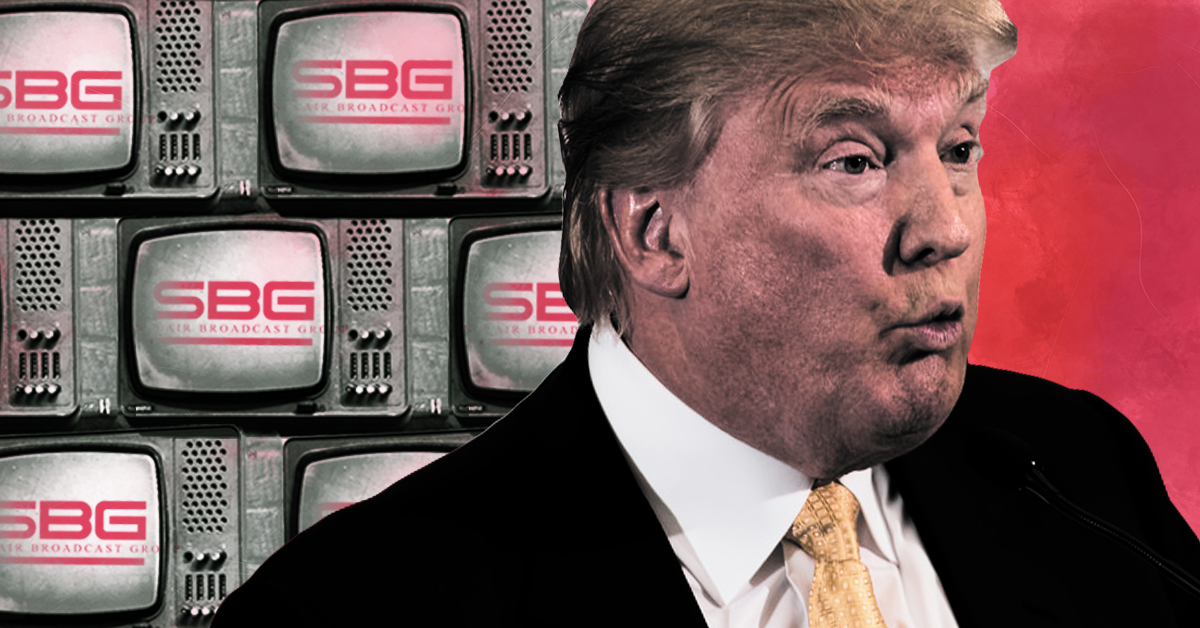
Sarah Wasko / Media Matters
The nefarious relationship between the Trump-era Federal Communications Commission (FCC), conservative local TV news giant Sinclair Broadcast Group, and the Trump administration itself is now under investigation.
On February 15, The New York Times reported that the FCC inspector general has opened an internal investigation into potential improper conduct by Trump-appointed FCC chair Ajit Pai and his aides in advocating for deregulatory rules that specifically benefited Sinclair.
The Times noted that little is known about the extent of the investigation, which was launched at end of last year but had been undisclosed until now. The investigation began after several lawmakers called on the inspector general to investigate a “disturbing pattern of a three way quid-pro-quo.” Congressional letters to the inspector general, David Hunt, detailed reports of communications and meetings involving Pai, the Trump White House, and Sinclair executives. According to the Times report:
A New York Times investigation published in August found that Mr. Pai and his staff members had met and corresponded with Sinclair executives several times. One meeting, with Sinclair’s executive chairman, took place days before Mr. Pai, who was appointed by President Trump, took over as F.C.C. chairman.
Sinclair’s top lobbyist, a former F.C.C. official, also communicated frequently with former agency colleagues and pushed for the relaxation of media ownership rules. And language the lobbyist used about loosening rules has tracked closely to analysis and language used by Mr. Pai in speeches favoring such changes.In November, several Democrats in Congress, including Mr. Pallone, called on the inspector general’s office to explore all communications — including personal emails, social media accounts, text messages and phone calls — between Sinclair and Mr. Pai and his staff.
The lawmakers also asked for communications between Mr. Pai’s office and the White House. They pointed to a report in March 2017 from The New York Post, in which Mr. Trump is said to have met with Sinclair’s executive chairman, David Smith, and discussed F.C.C. rules.
The internal investigation could also tackle a series of recent FCC actions that have directly allowed Sinclair greater room to expand:
- In April, the FCC reinstated an outdated media ownership rule known as the UHF discount, making room for a new level of local media consolidation at the hands of big media groups like Sinclair.
- Weeks later, Sinclair announced it was proposing to acquire Tribune Media, a huge local news merger that wouldn’t have been allowed without the UHF discount in place. The FCC and Trump’s Department of Justice are now the only agencies that need to approve the deal.
- In October, the FCC voted to eliminate a rule that required local news stations to maintain offices within the communities they serve, making it easier for Sinclair to consolidate and centralize local news resources as it buys up more stations.
- In November, the FCC rolled back rules that limit broadcast station ownership, allowing for Sinclair to more easily own or operate multiple stations -- or merge stations -- in the same local media markets.
Sinclair’s unprecedented gains under Pai’s purview are not just significant in terms of media consolidation; they’re ideologically dangerous. The company is known for requiring its local news stations across the country to air almost-daily segments that function as Trump propaganda. Its pending acquisition of Tribune would allow these segments to quietly spread further into major cities and battleground states ahead of the 2020 presidential race.
The new FCC internal investigation, however, could throw a wrench in Sinclair’s plans. According to the Times, “Antitrust experts said this new investigation may complicate the reviews of the Sinclair-Tribune deal by the F.C.C. and the Justice Department. Even if the deal were approved, they said, any conclusions of improper conduct by Mr. Pai could give fuel to critics to challenge the review in courts.”